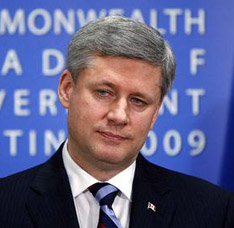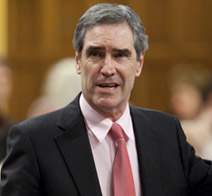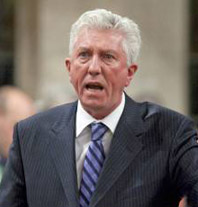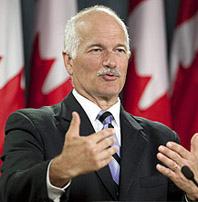How did PM Harper do it in 2009 .. and will it still work next year?
Dec 17th, 2009 | By Counterweights Editors | Category: In Brief
Conservative minority PM Stephen Harper at the Commonwealth Heads of Government Meeting in Port-of-Spain, Thursday, November 29, 2009. Reuters.
TORONTO. DECEMBER 17, 2009. It is hardly surprising when the Toronto Star’s Chantal Hébert explains how “Harper Tories are own worst enemies” – even though: “Only a few weeks ago” they seemed “headed for a triumphant year end.” But when anyone at the National Post asks “How does Harper do it?” – and then gives good reasons why he shouldn’t – you start to wonder what 2009 will mean in the ultimate unknown history of Canadian federal politics.
The National Post writer here, John Mraz, is somewhat unique. He calls himself “a liberal democrat who has spent a fair amount of time in war zones, both abroad and in Ottawa.”
In his entry this past Tuesday, mulling over how 2008 turned into 2009, Mraz actually wrote: “The proposed coalition between the NDP and the Liberals, with confidence support from the Bloc, was neither illegal nor unconstitutional. No matter how loudly anyone says it was. It might have been foolish, unwieldy or even unworkable – but similar coalitions have been formed in Westminster parliaments around the world, and I have no idea why our Governor-General saw fit to prorogue parliament and deny Canadians their democratic rights.”

Liberal leader Micheal Ignatieff in the Canadian House of Commons, Thursday December 10, 2009. The Canadian Press.
PM Harper may nonetheless be looking for another prorogation this December. Meanwhile, with only two weeks of 2009 left, Chantal Hébert claims that two issues have suddenly put a big question mark beside the Harper Conservative future – Canadian complicity in the torture of Afghan prisoners, and the climate change ponderings at Copenhagen.
Sceptics will say most Canadian voters don’t care deeply in either case. Yet what the federal electorate wants most at the moment just may be some peace and quiet. It was arguably the Ignatieff Liberals’ enthusiasm for more noise this past fall that crashed their opinion poll ratings.

Bloc Quebecois Leader Gilles Duceppe in the Canadian House of Commons, Thursday, December 10, 2009. The Canadian Press.
Sometimes it seems that Stephen Harper can deliver peace and quiet in Ottawa. But right now even a Conservative like Norman Spector is saying that unwillingness to call a judicial inquiry into allegations of complicity in the torture of Afghan prisoners only “suggests the Conservatives have something to hide.” And according to a Toronto Star editorial: “Canada’s a joke at climate talks” [in Copenhagen again, in case you’ve forgotten already].
The worst thing about the Afghan prisoner issue may finally be a noisy showdown between the traditional doctrine of the supremacy of parliament in our democracy, and the alleged national security prerogatives of a government elected by less than 38% of the active Canadian people.

NDP Leader Jack Layton says the federal government must hold a public inquiry into the handling of Afghan detainees before international bodies begin their own probe into the issue. The Canadian Press.
As Chantal Hébert implies, Mr. Harper may finally prove incapable of managing the Canadian federal government without recurrently provoking too much noise. Outside Western Canada, where he certainly has been a regional champion (and probably even in a so-far constructive way for Canada at large), he can point to few (if any?) big accomplishments. (Even if he has in some ways moved the country rather more to the right than the clear majority of the electorate wants?)
The very bottom line seems to be that Prime Minister Stephen Harper has been living off the avails of a very divided and inept progressive opposition, now going on almost four full years. He must pray every night that in 2010 his opponents will continue to wander in various wildernesses of their own planting – and leave him at least another minority government, whenever the next election comes.
The biggest question for the new year is: will his prayers be answered, yet again?
